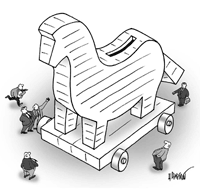| Political parties |  |





| Points of view |  |


| Elections |  |





| Useful information |  |



|  |
Local Elections 2003

Democratic Party of Moldova
 |
Chairperson:
Dumitru Diacov
Electoral slogans:
Join us!
Vote the three roses!
Vote Democratic Party candidates!
The Democratic Party proposes an administration that is "Next to the people, together with them!"
|
Electoral programme (abridged)
The Democratic Party of Moldova (DPM) regards the local elections for the election of mayors, local and district councillors as very significant. The new mandate should be not only the beginning of recovery, but also the time of gaining back our self-confidence and hope for a better future. To succeed in this, we need to adopt new principles of local leadership and administration, principles that need to be laid at the basis of the daily activity of the local elected officers of all levels.
The DPM, through its candidates, proposes a solid programme of local government based on RESPONSIBILITY, EXPERIENCE AND PROFESSIONALISM.
The DPM, at local level, will rule being guided by our major national interests:
- Overcoming the crisis that the Moldovan society is going through at present;
- Stabilising the economic and social situation;
- Harmonising interethnic and social relations;
- Ensuring a decent living for all Moldovan citizens, regardless of their national or religious origin.
LET US GIVE OUR COUNTRY WHAT IT NEEDS, LET US GIVE THE PEOPLE WHAT THEY DESERVE!
LET US TAKE CARE OF OUR LAND TOGETHER
I. In the social field:
- Promoting initiatives that ensure social protection for the most vulnerable categories of population - the unemployed, the elderly, families with invalid dependants, minors - such as full or partial tax waiver, free or lower cost access to public transportation, communal services, drugs, local cultural and sports events etc.;
- Supporting investment projects for the improvement of public health assistance;
- Supporting at the local level programmes of building houses, especially social houses, for young families;
- Fighting unemployment through differentiated measures: encouraging the development of small and medium size enterprises, additional motivation of business people and the unemployed, continuously extending professional training schemes.
II. In the financial field:
- Transparent and responsible administration of financial resources leading to the development of a short- and long-term strategy in order to avoid unnecessary spending;
- Fair distribution of the fiscal burden, without impoverishing the people or bring the economic agents on the verge of bankruptcy, quarterly accounts towards the local community of the distribution and spending of public money;
- Stimulating the private initiative for the creation of new commercial joint stock associations and facilitating the activity of the existing ones through a corresponding adjustment of local taxes to affordable levels;
- Attracting funds and grants from various international institutions for funding well-founded projects.
III. In the economic field:
- Economic relaunch of localities and mobilisation of resources for improving the living standard of the residents;
- Promoting the sale of agricultural products by organising regional food and agriculture fairs, setting up a national system of collecting and selling the goods, introducing state guarantees for timely payments for the sold goods;
- Reorganising and modernising the existent market places for a civilised trade;
- Stimulating the intensive and extensive uses of the local tourism potential, aiming in the first place at developing the cultural tourism, granting facilities to the economic agents who undertake their own tourism development projects in their localities.
IV. In the educational, cultural and sports fields:
- Education and health assistance should be funded in order of priority and supported both by the state and local budgets;
- Supporting education institutions (kindergartens, elementary schools, lyceums) in keeping them running and modernising their premises, fields and assets;
- Protecting in all ways the cultural patrimony and full capitalisation thereof;
- Imposing professional management in institutions of cultural purpose run at the local level, supporting public libraries;
- Repair, modernisation and maintenance of sports halls and fields belonging to schools;
- Allocation of financial and material means to upkeep museums and architectural and historic museums in the circuit of national values.
V. In the field of public order and citizen security:
- We will work directly and indirectly with all decision-makers concerned to ensure a civilised climate and the security of individuals and public and private property;
- The law enforcement bodies will be actively involved in guarding public order in premises of educational, cultural, administrative, sports and leisure institutions;
- Supporting projects and programmes aimed at protecting minors and families in disadvantaged environments.
VI. In the environmental field:
- Promoting environmental protection programmes, supporting environment friendly investment projects;
- Running projects on reducing the pollution levels in the most affected areas.
VII. In the field of civil society:
- Supporting and encouraging the development of non-governmental organisations in all fields so that these take over a number of responsibilities in the community, strengthen and diversify the third sector, particularly in such fields as human rights, education, culture, environment, charity work etc.;
- Initiating and supporting a permanent dialogue with the representatives of employers' organisations and local trade unions, other professional associations and organisations;
- Involving representatives of national minorities in relevant programmes and projects: setting up a socio-cultural information centre; carrying out programmes of juridical education and training on managing interethnic and intercultural conflicts;
- Encouraging the activity of local non-governmental organisations and associations advocating social and economic justice, equality of rights, non-discrimination and poverty alleviation etc.
The mentioned above is only a small part of our electoral offer for 2003-2007.
|
 |










|


